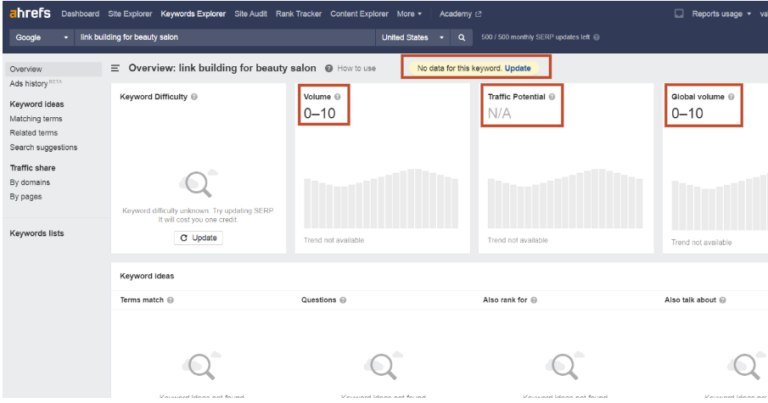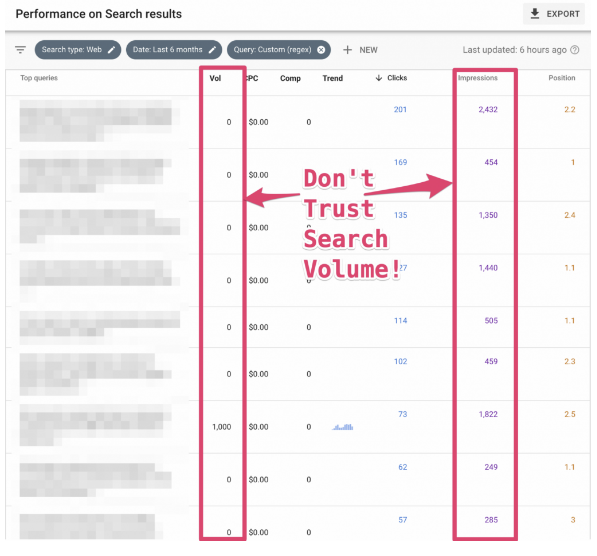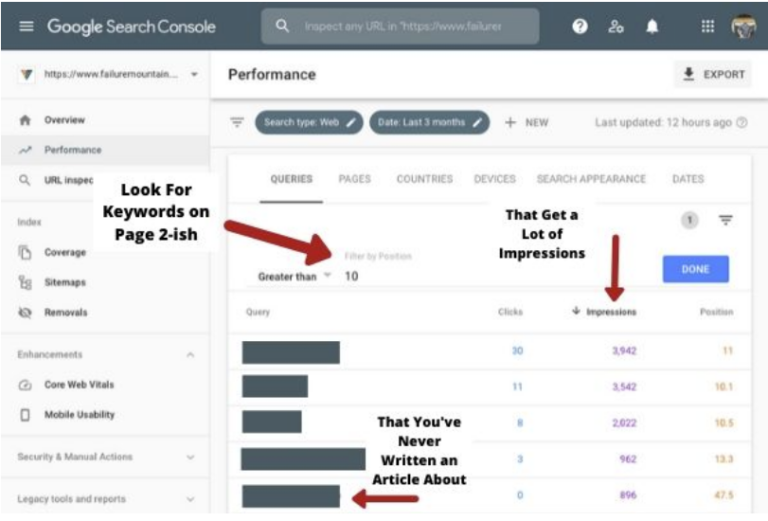In recent times, the prevailing SEO wisdom has been that if you want to increase your organic traffic, you need to target high-volume keywords. But what if there was a way to increase your organic traffic by targeting zero-volume keywords?
It sounds too good to be true, but it’s not.
The issue is that not all keyword research tools are reliable and consistently provide correct data when it comes to locating low-competition, high-traffic keywords (which is the ultimate goal).
Contrary to popular belief, you don’t necessarily need to target the keywords that receive the greatest traffic.
Imagine if you could increase your organic traffic by targeting keywords that nobody is bidding on. It turns out you can – and in this article, you will learn the secrets of SEO professionals who have been doing this for years.
What Are Zero-Volume Keywords?
In the world of SEO, a zero-volume keyword is a term or phrase that gets virtually no traffic.
For example, imagine you run an e-commerce store that sells shoes. If you were to use a keyword research tool like Google Keyword Planner and search for the term “buy shoes”, you would see that it has an average monthly search volume of 40,500.

Now, let’s say you come across the keyword “how to buy shoes”. When you plug it into Google Keyword Planner, you see that it has a monthly search volume of zero.
That’s a zero-volume keyword. And while it may seem counterintuitive, targeting these types of keywords can actually help you increase your organic traffic.
Low- to no-volume keywords are, by definition, low-competitive since keyword tools haven’t yet assessed these queries’ full potential. Thus, they are frequently inexpensive, simple, and extremely profitable. Why not like it?
In other words, these undiscovered gems provide more opportunities than are initially apparent. They frequently represent a strategic SEO gap and a wasted opportunity.
The primary targeting strategy that firms should pursue in many circumstances is the creation of a ton of material that is dedicated to this zero-volume approach.
This is particularly true when looking for keywords for:
- Niche markets
- B2B content
- Localized searches
Where Should You Use Zero-volume Keywords?
If you want to keep your ad costs down, there are many ways to efficiently create a successful campaign. For starters, you might use Google Keyword Planner.
However, research shows that there were some discrepancies with its “Average Monthly Search Volume” metric. This is why you get different results when you use different tools to research the same keyword. Furthermore, the “Local Monthly Searches” metric is often more accurate for small businesses that are targeting a local audience.
Because of this, you’ll discover that your website’s traffic statistics are far lower when you enter them into these programs than they could be in your Google Analytics.
So, where do zero-volume keywords come in?
Well, these are the keywords that don’t get a lot of searches per month. And while they may not be searched for as frequently as your high-volume keywords, they can still be powerful when used correctly. Here are a few tips on how you can use zero-volume keywords to increase your organic traffic.
1. Title Tags and Meta Descriptions
This is probably the most important place to use them, as they are what show up on the search engine results pages (SERPs). Your title tags should be attention-grabbing and accurately describe what’s on the page, while your meta descriptions should give a brief overview of the page’s content.
2. Headings and Subheadings
Headings and subheadings are a great way to break up your content and make it easier to read. They also help search engines understand the structure of your page. So, including zero-volume keywords in these elements can give your page a boost in the SERPs.
3. Throughout Your Content
Including keywords throughout your content helps search engines understand what your page is about. But don’t overdo it. Stuffing your content with too many keywords will not only make it difficult to read, but could also get you penalized by Google. A good rule of thumb is to keep your keyword density around 1-2% in your content strategy.
4. Use LSI Keywords
LSI (Latent Semantic Indexing) keywords are related terms that help search engines understand the context of your content. So including them, along with your zero-volume keywords, can give your page an extra boost in the SERPs.
5. Promote Your Content
Just because a keyword has low search volume doesn’t mean it’s not worth targeting. In fact, these keywords can be quite valuable if you’re able to rank for them. So once you’ve published your content, promote it. Share it on social media, send out an email newsletter, and reach out to influencers in your industry.
6. Monitor Your Results
Finally, don’t forget to monitor your results. Keep an eye on your organic traffic and look for any improvements in your rankings. This will help you determine whether your zero-volume keyword strategy is working.
By following these tips, you can use zero-volume keywords to increase your organic traffic. Just remember to focus on quality over quantity and to promote your content once it’s published.

Identifying the Right Zero-Volume Keywords
The process of increasing organic traffic with zero-volume keywords starts with identifying the right keywords. The planning process should start with your business objectives and target audience in mind. Once you have a good understanding of these factors, you can begin to brainstorm a list of potential keywords.
Explore Your Competition
Before you can identify the right keywords for your business, it’s important to understand what keywords your competition is targeting. This will give you a good starting point for your keyword research.
For example, if you’re a plumber in Los Angeles, you might want to check out the top 10 results for “plumber Los Angeles” on Google. This will give you an idea of what keywords are being used by other businesses in your industry and location.
Use Long-Tail Keywords
Long-tail keywords are specific and usually consist of three or more words. They are often more detailed than general, short-tail keywords. Long-tail keywords tend to be less competitive and can be a great way to get started with SEO. Let’s say you own a pet store. Some short-tail keywords you might want to target could be “pet supplies” or “pet food.”
However, since these terms are quite competitive they may be difficult to rank for. You could try targeting long-tail keywords such as “organic pet food” or “cat toys for indoor cats.”

Talk to Your Sales Team
Your sales team is a valuable resource when it comes to identifying potential keywords. They likely have a good understanding of the type of language your potential customers use when they’re interested in your products or services.
For example, if your lead scoring campaign focuses on selling software that helps businesses manage their social media accounts, your sales team might suggest targeting terms such as “social media management software” or “Twitter scheduling tool.”
Use Trends Analysis Tools
Other than keyword research tools, Google Trends and Pinterest trends can also be helpful in identifying potential keywords. These tools can show you which keywords are being searched for the most and what content is being shared the most on social media.
This information can give you insights into which keywords might be worth targeting.
Look Around Quora, Reddit, and Other Forums
Another great way to identify potential keywords is to look around popular forums such as Quora and Reddit. People often ask questions about products or services in these forums. And, you can use the search function to find threads that are relevant to your business.
For example, if you sell fitness equipment, you could search for “fitness equipment” on Quora and see what questions people are asking. This can give you ideas for potential keywords to target.
Measuring If They Are Working
Once you have your list of zero-volume keywords, it’s time to measure if they are working to increase your organic traffic. The most important metric you want to look at is your website’s organic search traffic volume. Here are some other metrics you can use to measure the success of your zero-volume keywords:
- Number of organic sessions
- Number of new organic users
- Organic conversion rate
- Average organic order value
- Revenue from organic traffic
- ROI from investment in zero-volume keywords
- Overall website traffic volume
- Website ranking for target keyword
These are just a few ideas, but ultimately you want to track whatever KPIs are important to your business in order to gauge the success of your zero-volume keywords.
Conclusion
Organic traffic is the lifeblood of many websites and businesses, so it’s important to find ways to increase it. One way to do this is by targeting zero-volume keywords.
These are keywords that have little to no monthly search volume but can still be ranked on the first page of Google. While they may not get a lot of searches, they can still bring in a decent amount of traffic and lead to conversions.
Every business looking to increase its organic traffic should consider targeting zero-volume keywords. By optimizing your website for these keywords and tracking your progress, you can see a significant increase in organic traffic with little to no competition.
If you think this is something you cannot do on your own, don’t hesitate to contact us for more information. Here at Pollock Marketing Group, we live and breathe SEO and are always happy to help out those in need.

